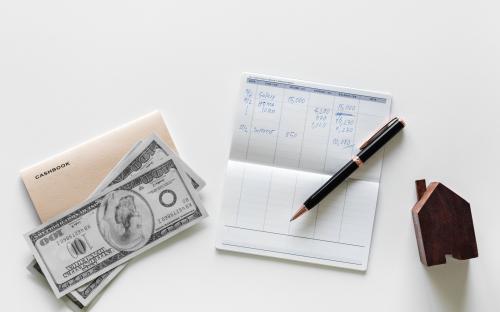DOWN PAYMENT AND CLOSING COSTS
HOW MUCH DO I NEED TO SAVE TO PUT DOWN ON A HOUSE? WHAT ARE MY OPTIONS?
This depends on several scenarios.
- How much money do you have or can you get?
- Can you afford the payment for the house you want with less money down?
- Programs range anywhere from .5% - 20% or more
- Looking at the big picture; where will house prices be 5 years, 10 years, or 30 years from now?
- What are your plans? Do you intend to be living in the house for more than 5 years?
- Is it more important to by the house now while the value of the home may be appreciating or can you wait to save up enough money for down payment? Will the price of the home be 10% to 20% higher by the time you save enough? Will interest rates be higher or lower?
- You need a house to live in and you can always rent while you save up enough. Keep in mind though, rent can be expensive and there is no return. If you can; buy your home now and realize equity appreciation.
- Do you want to have a cushion after you buy your home? Consider putting less down to retain a rainy day fund if you can afford the payment.
DETERMINE HOW TO get YOUR FUNDS TOGETHER FOR the DOWN PAYMENT AND CLOSING COSTS
Once you've determined how much you need for your down payment and closing costs, you need to be aware of the rules for your down payment money. The lender wants the home buyer to have skin in the game; they will want you to use your own money, not someone else’s. Any deposits into your bank accounts have a clear source and paper trail.
Your money may be “seasoned ” if you have had it for at least 60 days in your bank account. 60 days bank statements will be used to verify this. There can be no large deposits with in the 60 days on the bank statements or your funds are not seasoned. If there are any large deposits then you must show where the money came from. If you need assistance from a family member for your down payment, depositing it in your bank account well before you need it will really help.
A good tip is to set up a designated account you will be using for your home purchase. Do not have numerous deposits and withdrawals from this account, this will allow you to show your closing funds in one account and make your closing simpler.
A quick note on vested accounts: these are accounts where funds need to be liquidated to use. Stocks, bonds and vested retirement accounts are examples that will need a paper trail showing the liquidation or sale of the investments.
SOURCES FOR YOUR DOWN PAYMENT AND CLOSING COSTS
- Savings: Do some homework on the different ways to set saving goals and save.
- Gift: The donor must be a relative and cannot be a non arms length donor. FHA allows all gift funds for down payment. Conventional requires that you must have at least 5% of your own money unless you are putting down 20%. If there is anyone who can help you, it’s a great way to get a jump start on your funds to close. Parents and relatives may be willing to gift part of their anticipated inheritance to purchase a home.
- Brokerage Accounts: If you have stocks and/or bonds, once you liquidate them, you can use the proceeds to purchase your home.
- 401K, IRA and other retirement accounts: you can liquidate these, but remember, they're taxable events. You can also take out a loan against your own retirement account.
- Down payment assistance programs: make sure to explore available down payment assistance programs if you need help!

What will all the costs be? What are reoccurring and non reoccurring closing costs?
Closing costs are a part of buying your home; expect to pay anywhere from $5-10K for closing costs. You will get a lender estimate within 3 days of your loan submission once you are in contract. Your lender may show you a fee sheet if you are not in contract to give you an idea of what to expect.
Keep in mind, each state can have different fees.
Non-reoccurring closing costs: one time fees that include:
- Title insurance - for the lender and homeowner policy
- Escrow fee - charged as a percentage. This is a onetime fee charged by your title/escrwo company to close your transaction
- Appraisal fee - You will need an appraisal to make sure the home is worth what you are paying for it and the lender will require. Usually not more than 500.00 but it can be higher if the home is a higher priced home or it is a income property you are purchasing
- Misc fee - such as courier, loan tie-in, etc.
- Inspection report fees - Termite report and home inspection report. These can range from $150 - $300
- Underwriting fee - Charged by the bank. This fee can range between $800-$1,200 depending on the bank.
- Processing fee - Sometimes this will be charged by a mortgage broker, but many do not charge a processing fee.
- Credit reporting fee - Cost to run credit reports and any work needed regarding credit reports.
- Wire fee - This is for wiring in funds to escrow. Usually the lender will charge this for your loan.
- Tax cert fee - $20.00 charged to confirm current property taxes.
- Transfer Tax - in California, there is a transfer tax; it is based on a percentage and varies from county to county. Some cities have their own, in addition to the county property tax. In California, the tax is most commonly charged at 1.10 per thousand. Some higher cost areas have very high city transfer tax, so you will need to check with your realtor or lender on how much that will be. Sometimes the seller will pay for this.
Reoccurring Closing Costs:
- Mortgage interest - Accrues in advance each month. A full 30 day cycle is needed so interest can accrue and a payment can be calculated. When you close on your new home, “odd days interest” are charged in advance so that the correct mortgage payment can be calculated after the first 30 day cycle.
- Property taxes - Collected in advance. Property taxes are due in two separate installments each year. The fiscal year for property taxes is July 1st - June 30th. If the sellers owe any portion of the property tax due they will pay it to you at the time of closing. Any taxes that are coming due or where the bill has been sent out will be collected.
- Home owners & hazard insurance - If you lose your home to fire, the lender will want to make sure there is insurance to cover the cost of rebuilding the home. The lender will ask that the rebuild is according to the specs of your previous home. You may also be able to use the insurance claim to pay off the lender in order to rebuild the home to your own specs, however, you may need additional financing to do this.
- Escrow account - if you opt to pay taxes and insurance as a part of your mortgage payment, you will be required to fund a escrow account. Usually, 1 installment of the property taxes and 2 months of the hazard insurance policy will be collected. If you are making mortgage insurance payments, one month of that will also be collected.
Points - Origination and Discount
Origination: Because the lender pays your mortgage consultant, you won't pay any points. However, in some cases, you may opt for a borrower paid origination. Your loan officer will usually let you know if it makes more sense for you to pay the origination. This option is more typical on larger loans, such as Jumbo loans.
Discount: You do have an option to buy down your interest rate. This is known as a “paying down the rate”. Usually, paying for a rate decrease is not justified due to the high cost. You can ask your Mortgage Planner about this, however, they will normally let you know in advance if it makes sense during your initial consultation.
What is a lender credit and how do I get it for my loan?
Yield Spread Premium (YSP): this occurs when the interest rate you select has enough YSP to cover loan level price adjustments and some credits are left over. These credits are applied towards your closing costs and cannot be kept by the bank or loan officer.
For a slightly higher rate, you can opt for lender credits to pay for some or all of your closing costs. This is common with FHA loans as well as conventional. The advantage here is that you don't pay the closing costs out of your own pocket.
When do I lock my rate and what does that mean?
At some point during your transaction you will select an interest rate for your home loan. This is done with your Mortgage Planner and they will help you choose the correct rate depending on the scenario. Once you have decided on an interest rate, you will need to lock that in. This will protect your rate from movement during escrow. You can lock your rate for different time periods. 30 day locks are most common but they go up to 90 days.
Why do interest rates change every day?
Interest rates can change daily and tend to mimic the fluctuation of the 10 year Treasury note. If the yield of the 10 year Treasury note goes up then mortgage rates may follow and visa versa.
Mortgages are bundled into mortgage backed securities and are sold into a bond market; they have fluctuating yields just like treasuries. Since mortgages are bought and sold in MBS bundles, the interest you pay is dictated by the supply and demand of these bonds. Banks and lenders have their own pricing desks and issue there pricing accordingly. Since they are all in competition with each other; rate sheets tend to be similar from bank to bank. Sometimes if production volume is low or too high, lenders may buy the market by undercutting the market slightly or by slowing down the incoming applications by increasing pricing slightly.
Your Mortgage Planner will know which banks have the best pricing to assure you that your rate will be among the best priced offered.
Will the Seller pay for my closing costs?
Depending on your market, sellers may be willing to pay for or split closing costs with the buyer. Usually these are the title and escrow fees. Transfer tax is typically paid by the seller.
When you write your offer, you can ask for a credit towards closing costs. Generally this is acceptable in a buyer’s market. A sellers market means that buyers have little leverage and prices are appreciating rapidly. In a buyer’s market, price increases are slowing down, staying flat, or going down.




